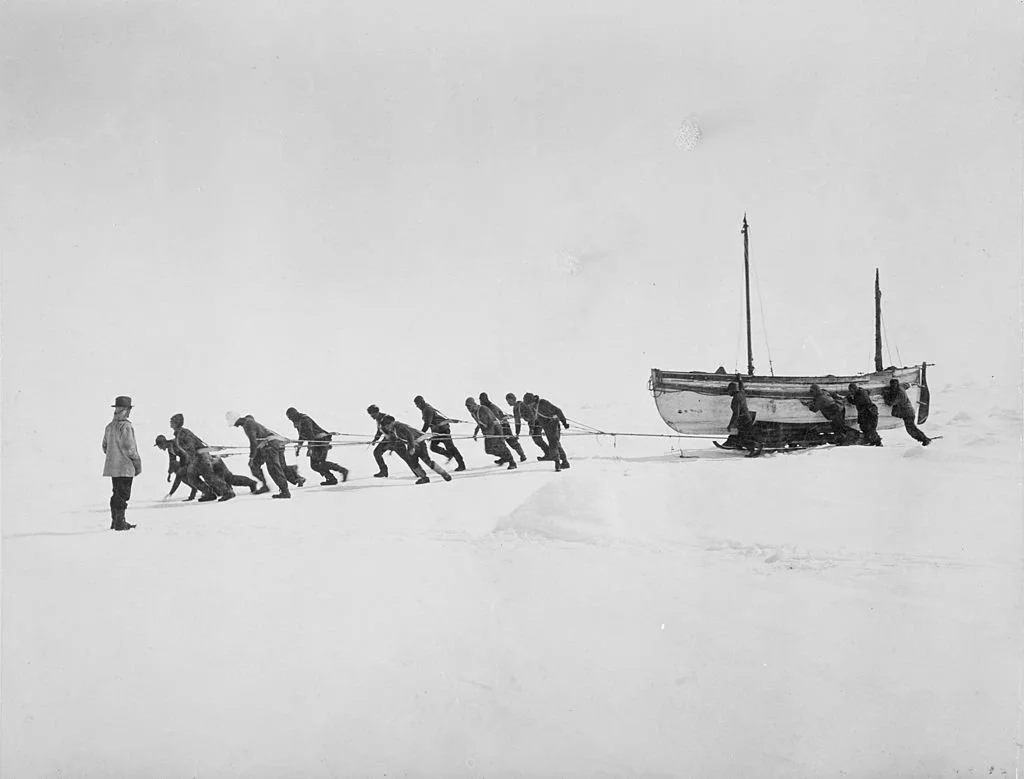Why the Best Leaders Give Credit Freely
We all know to give credit where credit is due. But when a boss or coworker—maybe a friend or sibling—take credit for something you really did, it hurts. Right?
In leadership, few actions are as powerful as giving credit to others. This simple yet profound gesture can inspire loyalty, build trust, and foster resilience. Yet, history—and our own experience—shows that it’s often neglected or twisted into self-serving gestures. True leadership understands that credit given freely strengthens relationships and motivates teams to achieve more.
Robert Peary and his second in command, Matthew Henson
The history books are littered with explorers who took credit for false accomplishments, and denied credit to those who helped them achieve their goals. Socially, they got away with it. Cosmically, I like to think not.
Take explorer Robert Peary, who once wrote his mother, "My last trip brought my name before the world; my next will give me a standing in the world....Remember, mother, I must have fame."
Is it any wonder that when Peary and his second in command, the incredible explorer Matthew Henson, neared the north pole in 1909, Peary stopped talking to Henson? This was their 8th expedition together, and Peary himself had proclaimed Henson, the rare African American explorer, “indispensable.” Yet the morning after they realized Henson had crossed their north pole mark (which has long been questioned), Peary took off for home without telling Henson.
He left him. In the north pole.
Their relationship remained fractured as Peary then traveled the world as a hero explorer while Henson fell victim to racial discrimination, requiring a recommendation from President Roosevelt for a job in a clerks office.
Shackleton’s Endurance crew pulling a lifeboat in Antarctica.
Modern Leadership
In any team, the impulse to hoard credit is tempting, especially under stress or when higher-ups are watching. Yet, denying credit to others often leads to resentment and weakens the unity of a team. To avoid Peary’s mistake, openly acknowledge each person’s contribution, even if it shifts the spotlight away from you. Genuine recognition can strengthen bonds and inspire deeper commitment to shared goals.
Contrast Peary with modern explorer, Felicity Aston, MBE. In 2018, Aston led the first all women’s expedition to the North Pole. To form the team, she put out an open call, receiving over 1,000 applications from women around the world—some who’d never seen snow before. Her book Polar Exposure is one of my favorites (devoured it this year), and is so full of wisdom.
But for our purposes here, as expedition leader, Aston is very open about giving credit to particular team members for each individual benefit they brought to the expedition as a whole. She valued them to such a degree that she asked all 11 women to contribute to the book. Not only does this show gratitude and appreciation, for us trying to learn from exploration wherever we are, the decision enables us to see a cross section of personalities, backgrounds, hopes, fears, drive. That’s something everyone can celebrate.
Leadership Application:
When I spoke with Rob McCallum, the expedition leader for the Five Deeps expedition and co-founder of EYOS Expeditions, I was struck by his emphasis on leaders ditching their egos and recognizing team members as a regular part of their daily meetings.
“Thanks to the galley team for having a meal ready, even after a late and exhausting dive.”
“Thanks to the laundry crew for prepping the flight suits—they looked great in the documentary shots.”
“Chief Engineer, thanks for making sure the water systems are running smoothly.”
It wasn’t forced or over-the-top—it was just part of their conversations. No high-fives or back-slapping, just honest recognition of effort. That way, it never felt like favoritism, just a natural acknowledgment of teamwork.
"The laundry guy never said a word in the meetings," Rob said. "But he was as essential as the chief sub pilot."
In business, leaders can cultivate this mindset by inviting team members to share their experiences or contributions in team meetings or company reports. Recognition, when given simply and genuinely, helps reinforce a sense of unity and inclusivity.
Explorer and writer Felicity Aston understands the personal and professional value of giving credit.
The Science of Giving Credit
Behavioral statistician Joseph Folkman conducted a deep dive on leadership effectiveness by assessing over 3,800 leaders using 360-degree evaluations from managers, peers, direct reports, and others. Each person was assessed on their tendency to take credit from or give credit to others, among other behaviors.
Leaders whose tendency was to take credit were rated in the 13th percentile, very ineffective, while those who tried hard to give the credit to others were rated in the 85th percentile, some of the most effective. This data demonstrates the dramatic negative effect of taking credit, along with the positive impact of giving credit to others.
When a leader gives credit to others:
It shows gratitude, and gratitude is an essential ingredient in building faith and loyalty in one’s leader. Gratitude feeds the soul, and when you’re going through hard times, that’s what drives people to keep going.
Chances are, you’ll also participate in multiple projects with the same people. Give them credit on the first, and they’ll remember it on the second.
It motivates individual team members, and, since energy spreads, motivates the team as a whole.
But here’s the secret to giving credit:
You cannot expect ANYTHING in return.
Writer John Steinbeck shared in his exploration captured in the classic Log from the Sea of Cortez, that “Perhaps the most overrated virtue in our list of shoddy virtues is that of giving. Giving builds up the ego of the giver, makes him superior and higher and larger than the receiver. Nearly always, giving is a selfish pleasure, and in many cases, it is a downright destructive and evil thing.”
Yes, we must give credit and compliments and gratitude and everything else—and do it simply because it is the right thing to do. If you give credit and gratitude expecting any benefit in return, you are trying to manipulate a situation, or people. Only when you do not expect anything will you receive something truly meaningful.
Practical Ways to Give Credit
Here are a few strategies for leaders looking to make recognition a daily habit:
Regular Team Acknowledgments: Dedicate a moment in weekly meetings to acknowledge contributions. It can be as simple as a quick thank-you for a job well done or highlighting specific actions that advanced a project.
Public Recognition: Acknowledge team members’ work in front of higher-ups or in client meetings when appropriate. It reinforces trust and builds confidence in the entire team’s abilities.
Personal Thank-You Notes: Sometimes a private gesture, like a thank-you note or message, can mean just as much as public praise. Let team members know how their specific contributions helped achieve goals.
Establish a Recognition Culture: Create opportunities for team members to recognize each other. Peer recognition can foster camaraderie and makes credit-giving a shared responsibility.
Addressing Challenges in Giving Credit
Of course, giving credit isn’t always straightforward. Here’s how to handle some common hurdles:
Ensuring It’s Genuine: Make sure to give credit where it’s deserved and not out of habit or obligation. Focus on specific contributions rather than general praise.
Balancing Credit and Accountability: Sometimes, leaders worry that giving credit might dilute accountability. Instead, use recognition to highlight growth and improvements alongside achievements.
Operating in Low-Recognition Cultures: If recognition isn’t part of the current culture, start small. Model the behavior, and others are likely to follow.
Lead by Giving
Reflect on your own leadership style. Are you giving credit freely, or are you holding back, hoping to stand out? Think about what Felicity Aston and even the lessons of Robert Peary reveal. The most celebrated leaders don’t stand on their own; they recognize and elevate others with them.
So, as you think about your work, your coworkers, your family, and a higher view of yourself through your interactions, remember:
Take all the credit and you alone will be singing your praises alone.
Give credit freely and without expectation and you’ll have a chorus of supporters.
For more from Felicity Aston, including her book Life Lessons from Explorers, visit: https://www.felicityaston.co.uk/.
She is also an incredible speaker for conferences, executive training, and more.
You can now also watch the incredible film Exposure about the first all-women expedition to ski to the North Pole.




